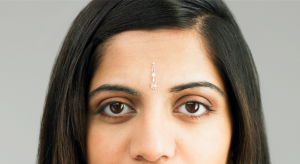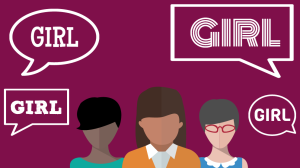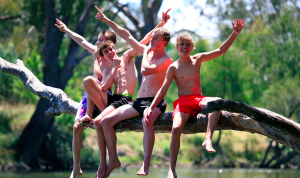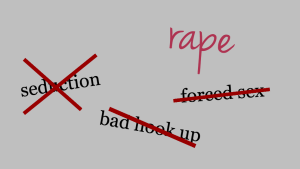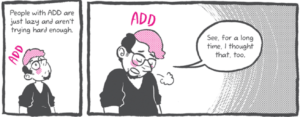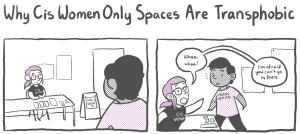
Source: Getty Images
“To trust children, we must first learn to trust ourselves… and most of us were taught as children that we could not be trusted.” —John Holt
Did it matter to you, as a child, whether an adult believed in you?
Was your mother’s acceptance important?
Or maybe it was your favorite teacher’s nod of approval?
That gratifying good job fist-bump from your cool uncle?
An adult’s sign of approval meant that we – as needy, mistake-prone children – were finally doing something right. We were becoming more mature, more trustworthy, more adult-ish.
We want children to grow into responsible adults. And responsible basically means financially stable, socially well-adjusted, and mentally healthy, right?
The more adult-ish behavior a child displays, the more we trust that they’ll make smart, safe choices without our guidance or enforced boundaries.
But children don’t just need adults to help them learn how to make safe choices and follow directions. They also need us to make space for them to learn how to lead and trust themselves.
Children need to build healthy senses of agency so that they become adults who feel equipped to manage their behaviors and to understand their own thoughts.
But we can’t help them practice those skills if we do not prioritize them.
And the problem is that we tend to prioritize intellectual development (education) while neglecting emotional intelligence (intuition).
But the truth is that both are necessary to take a whole-person approach to supporting children. Because a strong connection to intuition can promote healthy agency and amplify confident self-expression.
Lacking practice in emotional intelligence skills, though, children risk becoming adults who are grossly unpracticed in their abilities to recognize, interpret, manage, and gauge their emotions and the emotions of others.
And when a person can’t feel comfortable making choices for themselves, or confident about how they relate to other people, their personal relationships and emotional wellness suffer.
So let’s look at three common ways that a lack of self-trust shows up in our adult lives. Because understanding our own barriers to a healthy sense of agency can help us to better lead ourselves, and to model healthier options to children we love.
1. We Learned to Value Forced Education Instead of Genuine Lifelong Learning
I once sat on a parenting panel where a mother of five girls said that none of her daughters were interested in learning, and that if she didn’t force them, they wouldn’t learn anything.
Hearing her say that – and hearing in her voice that she believed it – really broke my heart. But it didn’t surprise me. It’s a perspective that some parents find hard to let go.
We live in a time where we look for external validation and measurable proof to tell us whether something we do is valuable or valid. We don’t look to students. Or teachers. We look to test scores.
Children who do well in school get praised, and are made to feel confident. Confidence, therefore, is built through approval from other people – usually adults.
This is so far true that even when we become adults – and, in theory, can manage and validate ourselves – we still worry about what other people think about our choices, about our lives.
We want autonomy. We want to give zero fucks and follow our bliss. But the evidence from our own battles with trusting our intuition shows up and denies us permission.
This socialization toward an outward focus for validation affects the way we care for children, too.
Even though they’re rarely given the opportunity, it’s decided that children need to be told what to learn and how to learn it.
And this is harmful because it tells children that we don’t trust them to participate in meaningful decisions about their own lives.
We make that choice for them.
Children should have a say in what they learn. They should have space in their day for getting to understand how they learn, and exploring their interests through all available concrete, digital, and human resources.
They should be supported in using intuition (theirs and ours), instead of rules created and enforced by adults.
For example, we look to concrete, highly generalized, often racist high-stakes testing structures to tell us whether children are learning.
But in reality, since these formats don’t factor in variances in learning styles, and tend to undervalue cultural context and self-identity, they consistently fail many of our children.
Still, we operate with the mindset that these structures, with their focus on intellect, represent our best chance at guiding our children toward a thriving adulthood.
But our children’s teachers are limited by policies and politics. And since we came out of those problematic structures, most of us recognize that school wasn’t the place we learned to thrive.
For many, it was daily life experience – home life, personal interests, and even chance meetings – that influenced the people we became. And we can nurture, rather than stifle, the contemplation of these experiences in children.
For my unschooling family, it’s debatable whether children need school at all. But certainly, without emotional intelligence, good sense of agency and social awareness, it becomes increasingly difficult to value ourselves in childhood – and to develop that sense of value in adulthood.
2. We Learned to Accept Violence as a Normal Part of Love
“All too often, women believe it is a sign of commitment, an expression of love, to endure unkindness or cruelty, to forgive and forget. In actuality, when we love rightly, we know that the healthy, loving response to cruelty and abuse is putting ourselves out of harm’s way.” —bell hooks
And hooks’ point applies to all genders. And all ages.
I have hit my daughters before. I don’t ever call it spanking, either. I hit them. Whether hard or not-too-hard; on the butt or in their palm, it was hitting, and it is done to children by an adult who loves them.
Because they need discipline. And because if they don’t listen to my words, as a caring parent, my next step should be to physically intimidate them into doing what I say.
I was that parent. But today, that shit sounds like violence to me.
As for why I ever hit my daughters in the first place, it was to effect immediate change in their behavior. It was a thing that was done to me by my mother, “for my own good,” even though it didn’t feel good.
I accepted it as normal.
But on that same parenting panel I mentioned earlier, the one with the mom who broke my heart, I met another woman – and this one changed my mind about hitting my children.
Toya Graham was beating her sixteen-year-old son when she found him skipping school. Her son was attending one of the riots sparked when Freddie Gray, a young Black man in Baltimore police custody, died from suspicious spinal injuries.
I can only imagine how fearful Toya must have been for her son’s safety. But as I watched the video of her and her son, then sat there as she sat a few feet away from me, explaining her rationale for slapping and pushing her son, even as he tried to walk away, I recognized her choice as one that could no longer work for me.
I have the luxury of not having had Toya’s specific experience. But it also allowed me to watch a mother beat on a child out of what she called love.
I had hit my daughters out of that same love before. And I was wrong.
So, I changed my mind about hitting my daughters.
I don’t want them to go against their natural instinct to avoid and protect themselves against physical harm. Nor their emotional capacity to accept abuse of any kind in any relationship that claims to include love.
Violence is violence.
Degrees may vary, but I can’t justify it parent-to-child. After all, I’m not defending myself when I hit my daughters. Nor am I modeling what I would think makes sense for them to do in a moment of conflict with someone they loved.
And when I spoke to my husband about it, neither of us could make sense of it being okay for him to hit them, but also telling them that that there are no instances where it is okay for a man who loves and feels a sense of responsibility for them, to hit them if he doesn’t agree with something they did.
Now I see that I can’t afford for my daughters, particularly as Black women becoming, to surrender their bodies to be attacked, for any reason, by anyone – including, and particularly, people who say they love them.
3. We Learned to Replace Our Intuition with Our Caretakers’ Directives
Most people can think of an example when their intuition steered them away from an otherwise unrecognized danger.
Like a gut feeling about a person that turned out to be spot-on. Or that instinct that compelled you to stick your foot between the door and the frame before you realized you had left your keys inside the apartment.
In their Leadership section, Forbes Magazine published a piece where Margie Warrell talks about the importance of trusting intuition in adulthood. Warrell gave examples of how the emotional intelligence skill of intuition helps human beings live longer, take smarter risks, and help other people.
But intuition can be hard to explain to children, much less explore and strengthen, especially when we weren’t given those opportunities ourselves as children.
We, ourselves, may have been taught to diminish or dismiss our intuition in favor of more “logical” or practical skills. We come to realize that the world around us sees maturity as a shift from using feelings to using logic and pragmatism instead.
In this state of constant need for input and approval from someone outside themselves, some children become adults who won’t recognize emotionally dangerous environments until they’ve suffered in them for far too long. Maybe you’re one of them.
My mother has lived her version of that raw reality. She told me that her twenties and thirties were the worst years of her life. She said she had very little confidence in herself, and that it influenced her staying in harmful relationships, hoping that her partner could offer her what she couldn’t offer herself. She wrapped her identity in her relationships, and she accepted being led because she wasn’t clear of the option to lead herself.
When I listen to my mother’s stories, and recall some of my own experiences, I can see the clear connection between trusting myself and my intuition, how I feel about the choices I make, and the things I experience as a result of my choices.
Mom also sees how the environment of adult-led choices with little regard to her sense of agency as a child fostered a lack of ability to gauge and assert her own needs.
I can see that happening to any of us, too – since we deal with similar issues, even though we are no longer children.
A supervisor can silence a lower-level employee. Corporate culture determines what she can wear to her office job. Body-shaming determines whether he feels confident wearing that shirt. And influential public personalities make us feel guilty about other people’s abuses against us.
This is why we need to help children nurture their intuition.
Intuition is a holistic thing. It informs our actions, our perspectives, our resiliency, our capacity to take calculated risks, and our willingness to adapt to life’s changes.
When we trust ourselves to make healthy choices toward our own wellbeing, our mental health is positively affected.
When we don’t trust ourselves to make good choices, we worry about every decision, we fall into unhealthy patterns (often in the form of a toxic relationship), and we constantly feel the need for outside opinion to help us feel “sure” of our choices.
***
For sure, children need adult guidance. But we can pay more attention to whether that guidance is getting in the way of the development of children’s emotional intelligence.
Instead of force-feeding directives and information, causing a disconnect between children and their intuitive selves, we must leave room for children to engage in meaningful participation in the decisions that directly affect them.
Give them real choices – and honor what they choose.
This may not always feel practical, or feasible, but that disconnect from intuition breeds an absence of a sense of personal agency and empathy, among other skills that are necessary for a child to transition into confident, whole-person adulthood – the type of adult experience, perhaps, that you and I are still working toward today.
We can influence the cycle of underdeveloped emotional intelligence by encouraging self-expression, respecting a child’s personal process or unique needs, and making sure they know the importance of both intellect and intuition when it comes to increasing their chances of confidence and personal fulfillment in adulthood.
And if we do right by children, we can dare to endeavor to fix what Nigerian poet Ijeoma Umebinyuo has called out as “broken children, living in grown bodies, mimicking adult lives.”
[do_widget id=’text-101′]
Akilah S. Richards is a Contributing Writer for Everyday Feminism. She is a six-time author, digital content writer, and lifestyle coach who writes passionately about self-expression, womanhood, modern feminism, location independence and the unschooling lifestyle. Connect with Akilah on Instagram, Tumblr, or her #radicalselfie e-home, radicalselfie.com. Read her articles.
Search our 3000+ articles!
Read our articles about:
Our online racial justice training
Used by hundreds of universities, non-profits, and businesses.
Click to learn more








